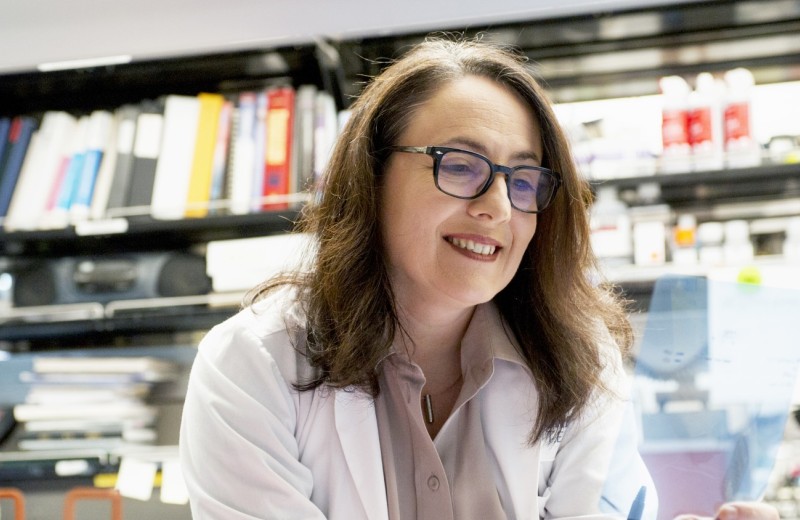Gladstone NOW: The Campaign Join Us on the Journey✕

Victoria Rafalski is a postdoctoral scholar in the Akassoglou lab. She joined Gladstone after earning a PhD in neuroscience and completing a short postdoctoral fellowship at Stanford University. [Photo: Chris Goodfellow, Gladstone Institutes]
What brought you to Gladstone?
Three things influenced my decision to come to Gladstone. First, the research topic and in vivo imaging techniques in Katerina Akassoglou’s lab were a big draw. Investigating brain-vasculature interactions with an eye toward disease application was something a bit different from what I studied in graduate school (basic science of neural stem cells), and it was important to me to learn something new. Second, I wanted to stay in the Bay Area, because I had made a life here during graduate school at Stanford. Finally, Gladstone has had a reputation for being one of the best places for postdocs to work, which “sealed the deal” in my mind.
What do you like about Gladstone?
It's great to be part of a close community of scientists in an independent research institute that is within close proximity of UCSF. I like that I recognize and exchange “hellos” with most people I see during the day.
What or who influenced your decision to work in science?
I have loved the natural world since I was a child—collecting bugs, growing plants, and going on walks in the woods. I am a curious person and ask a lot of questions. My parents were both scientists, which probably also had something to do with it. When I worked in a lab as an undergraduate, I realized that the job of an experimentalist is a special one—we get to work with our hands to answer fascinating questions that may positively impact humankind. And no day is the same or boring!
Why did you choose to study neurobiology?
The brain is still largely uncharted territory. Without the brain, you have nothing. I wanted to contribute to our understanding of this special organ.
What do you think is the biggest challenge facing young scientists? Do you think there is a solution?
I imagine that a formidable challenge for many young scientists is the decision to remain in academia when there are other paths that could bring more money for less effort, especially with such low levels of government funding for research. However, I think it’s important to ask whether a certain career path allows one to stay true to one’s values. For example, I greatly value knowledge, both acquiring and producing it, so academic research has been the best path for me.
What advice would you give a graduate student or postdoc?
Try to find successes throughout the day, even ones that seem trivial, like running a well-controlled Western blot that works the first time or patch-clamping a neuron. The huge successes, like papers and grants, don’t happen often enough, and it’s important to have positive reinforcement to continue in science.
What do you do when you are not working in the lab?
I wander around the different neighborhoods of San Francisco and the East Bay, finding new restaurants with good ambiance to enjoy with friends. I also have a passion for helping animals in need, so I volunteer at Family Dog Rescue in the Mission.
What is your hidden/unique talent?
I can make quick meals out of just a few things in the refrigerator. Lately, I have made many quick meals with tomatoes—I can’t eat enough of them! Sliced vine tomatoes drizzled with olive oil, salt, and pepper, served with bread and cheese on the side. It’s so simple, but completely satisfying.
If you could learn to do anything, what would it be?
I like being self-sufficient, and I like projects. If I had the time, space, and resources, I would become an expert woodworker. It strikes me as a lost art.
If you could meet any scientist from any point in time, who would it be and why?
Oliver Sacks. While he is technically a neurologist and writer, he qualifies as a scientist in my mind. He recently passed away, and I feel it’s a great loss for the biomedical community and the world. I could tell he was a kindred spirit. I would ask him to tell me stories from his life and share his vision for the future of neuroscience.
Katerina Akassoglou Receives Zenith Fellows Award to Advance Alzheimer’s Research
Katerina Akassoglou Receives Zenith Fellows Award to Advance Alzheimer’s Research
Akassoglou has opened doors to understanding how the blood protein fibrin is involved in Alzheimer’s and other neurodegenerative diseases.
Awards News Release Alzheimer’s Disease Center for Neurovascular Brain Immunology Akassoglou LabInside the Brain: Tackling Neurological Disease at Its Roots
Inside the Brain: Tackling Neurological Disease at Its Roots
For World Brain Day, discover some of Gladstone’s latest breakthroughs in neurological research.
Gladstone Experts Research (Publication) Alzheimer’s Disease COVID-19 Parkinson’s Disease Neurological Disease Akassoglou Lab Corces Lab Huang Lab Mucke LabZhaoqi Yan Named a 2025 Warren Alpert Distinguished Scholar
Zhaoqi Yan Named a 2025 Warren Alpert Distinguished Scholar
Gladstone researcher receives prize to study blood-brain barrier dysfunction and its impact on neurological disease.
Awards News Release Alzheimer’s Disease Neurological Disease Akassoglou Lab



